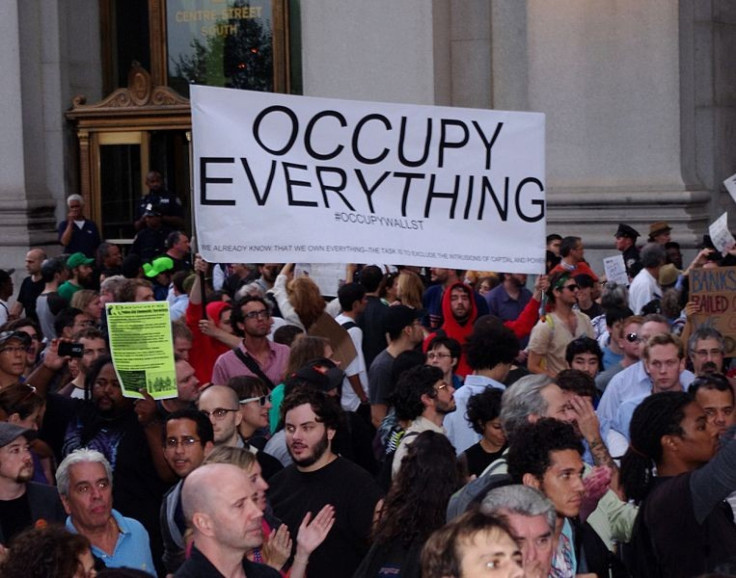Occupy Wall Street Finds Money Brings Problems Too

Occupy Wall Street has raised more than $500,000 in New York alone to support anti-greed demonstrations and, seven weeks into the movement, protesters are finding that having money creates headaches.
The challenges have included how to become a non-profit entity, how to deal with credit card companies withholding donations, choosing a bank that shares the movement's philosophy and budgeting what to spend cash on.
The totals raised -- more than $500,000 in New York and around $20,000 in Chicago, Richmond and other cities -- have surprised everyone from the protesters to those overseeing their finances.
I figured they would bring in maybe $10,000, maybe $20,000 and it would be no big deal. They were quickly bringing in that much and more a day, said Chuck Kaufman, the Tucson-based national co-coordinator of Alliance for Global Justice (AFGJ), the movement's fiscal sponsor.
We were surprised and unprepared so it was a scramble to get our end of the system functioning at the volume the money was coming in.
AFGJ is a non-profit group with roots in Nicaraguan solidarity activism of the 1970s that has since used its tax-exempt status to be a financial umbrella for other groups.
Occupy Wall Street pays 7 percent of its takings for AFGJ's support -- book-keeping, tax returns and donation processing.
Although the Occupy Wall Street finance committee's website lists 87 members, Kaufman said the core was about six people, including a lawyer, an accountant and a tattoo artist.
They deal with more than 400 donations coming in daily via credit card, averaging less than $50 each. Actually getting those donations has proved hard.
CREDIT CARD WOES
In the early days, before switching providers, the alliance took in some $250,000 in donations. Kaufman said credit card processors have held back $75,000 of that, claiming they expect an abnormally high level of disputes on the charges.
He expects the funds to be released in $25,000 increments every two weeks, once October credit card statements start going out.
None of the major credit card networks returned calls for comment on any unusual reserves being taken.
Since the movement switched to the online donation site WePay, another $196,000 has come in, which gets routed like the rest of the money to Occupy Wall Street's bank account.
A survey of Occupy camps across the country reveals each protest is relying on local donations.
Protesters holding the purse strings in New York were keen to stress how expensive the city is and how hard it will be for the movement to sustain itself over the winter.
People don't understand that this is New York, we pay New York prices, said Pete Dutro, one of the core members of the Occupy Wall Street finance committee.
These occupations ain't cheap, said Dutro, a tattoo artist who was studying finance at New York University before putting his studies on hold to join the protest.
The movement is keeping its money at Amalgamated Bank, which was started in the 1920s by a garment-workers union and was until recently 100 percent union-owned.
That sole union ownership ended in September just as the protests were starting. Nine days after the demonstrations began, Amalgamated sold 40 percent of its stock to two of America's best-known investors, Wilbur Ross and Ron Burkle.
Ross buys and merges distressed companies in industries such as steel, coal and auto parts. Burkle is best known for his investments in grocery companies and has good relations with unions. Both Ross and Burkle are billionaires.
An Amalgamated spokesman did not return calls for comment.
Dutro was wary about Ross and Burkle's stake in Amalgamated but said the people in that bank and in their management are very committed to their principles, and I really don't see them being co-opted by a couple of vultures.
Representatives for Ross and Burkle did not return calls for comment.
Last Friday, the Occupy Wall Street finance committee made one of its first detailed reports, saying it had spent $55,000 to date, including $22,000 for food, medical care and laundry and $20,000 on communications systems.
Dutro, who has a background in operations management at Internet services companies, said the amount raised so far should be taken in context.
People see like $500,000 and they say 'Wow that's a lot of money' but the reality is it's not that much money. You have a huge community -- we're bigger than most of the occupations -- and we probably spent a lot more money, he said.
While Occupy Wall Street has had attention over its money and whether it should share with movements in other cities, most camps say they are just fine on their own.
People have come up and said they want to give us contributions from $5,000 to $15,000 but we've told them no, Occupy Chicago's Orion Swann said, adding the group has raised less than $20,000.
Right now we are figuring out how to establish a legal identity so we're holding off on accepting donations.
(Additional reporting by Michelle Nichols in New York, Lily Kuo in Washington, Ned Barnett in Raleigh, Barbara Liston in Orlando, Jason Tomassini in Baltimore, Matthew Ward in Richmond, Bruce Olson in St. Louis, Daniel Lovering in Pittsburgh and Andrew Stern in Chicago; Editing by Mark Egan and John O'Callaghan)
© Copyright Thomson Reuters 2024. All rights reserved.





















